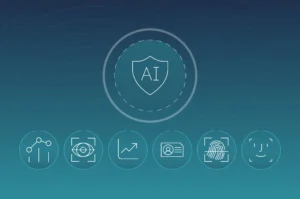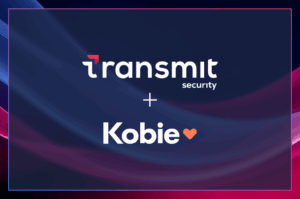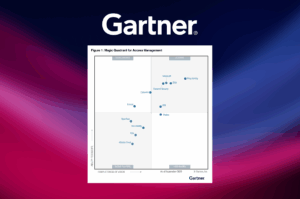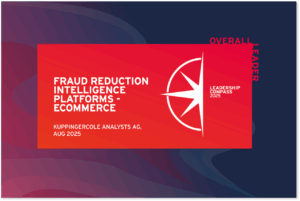It’s been an incredibly exciting time here at Transmit Security since the announcement of our record-breaking Series A round of funding. We sat down with our ever-inspiring co-founders Mickey Boodaei and Rakesh Loonkar to uncover their thoughts on the importance of eliminating passwords, the milestones they are most proud of and what the future holds for Transmit Security after raising $543M.
1. Mickey, you said in a recent interview that it’s very hard to resist all the funding opportunities that are available. Is there a reason why you decided to accept funding now?
Mickey Boodaei: We’re facing a massive market opportunity and in order to capture it there are three aspects in which this round could significantly help us. The first is that we found venture partners who share our vision and are capable of accelerating our growth engines. Typically, the bigger the round is, the bigger the commitment — and that’s one of the reasons why we chose to do a big round. Our investors have a huge amount of experience with companies of our size and stage and for the first time, we feel that the right investors can bring real and sustainable value.
The second reason is our huge effort to recruit new talents at all levels. One of the main tools employees use to assess a potential job opportunity is investment rounds and valuations. As a private company that has never been through an external financing round it was very hard for candidates to compare us to other opportunities they had. Here as well we wanted to aim for a big round with the most respectable investors to show how the market views us.
The third reason was to challenge ourselves. After a few years of being the founders and the board, we believe it’s time for others to get involved and challenge the company to reach higher achievements.
2. What is your mission for the company now? Has it changed since the company went to market with its first product in 2016?
Rakesh Loonkar: The mission is the same; Transmit will be the market leader in password replacement. We want to offer application owners the best and easiest way to delight their customers with compelling user experiences.
3. How do you envision Transmit Security moving forward after this impressive investment?
Mickey: There are a few layers to this question. Firstly we’re going to continue to recruit the best technical talents, especially in Israel, where our development center is located. Our employees are the reason for our success and we’re going to make sure we maintain our leadership in terms of talent.
The second layer has to do with our completeness of vision. We have a very exciting vision of how identity management should look like in the future. Today, we’re seeing other vendors adopting concepts that we invented six years ago — that’s very flattering and gives us confidence that we’re leading the visionary part of our space. But our vision is much broader and we have much to achieve. With this investment round we can move faster to achieve it.
The third layer is our go to market. We want to expand to more verticals, more regions and more use cases. We’re going to execute on that in the very near future.
4. Looking back, did you think this is where you would be today when you first set out to build Transmit Security?
Rakesh: I’m proud of what the Transmit team has accomplished to date. However, I always know we can do better, and that we have the potential to be much larger. I view building a company as a long uphill mountain climb. Each step is a lot of work, a lot of effort. We have a lot more to climb before we enjoy the view. Step by step, we’ll get there.
5. What makes Transmit Security different in the identity space?
Mickey: Our clear differentiation in the market is the profound orchestration technology we’ve developed. Our orchestration technology is used today by many of the leading enterprises around the world to deliver their desired identity experience to their customers. Our orchestration technology was built to solve difficult problems. Identity is one of the most complex and difficult problems today. Delivering it securely and without an impact on customer experience is a real challenge. Going passwordless is one of the most difficult orchestration challenges we’re facing today. It involves orchestrating browsers, devices, applications, channels and user behaviors. We see the great benefits of our orchestration technology in being able to deliver a comprehensive passwordless solution that really gets rid of passwords and not just tries to hide them.
6. What are the three milestones of Transmit Security you are most proud of?
Rakesh: For me, it’s that our customers are absolutely delighted in doing business with Transmit. Bootstrapping the business to a multi-billion $ valuation and building a high integrity company culture where every employee is valued for what they bring.
Mickey: Designing and implementing an architecture that allows enterprises to go passwordless for consumers is a huge milestone that I’m extremely proud of. Everyone talks about going passwordless but what they really do is just try to hide passwords as much as they can. The password is still there and can be used by attackers to takeover accounts and consumers will eventually need to use their passwords when switching devices, browsers, etc. Eliminating passwords altogether is a completely different game and we are the first to reach that.
The second milestone I’m really proud of is reaching 200 employees globally. Today we have employees in North America, South America, Europe, Asia and Australia. This is a sign of a global company. Being able to attract talent from across the globe is critical to our success as a global identity provider. We have some of the most brilliant brains in the industry and this allows us to build great technologies and an amazing business.
The third milestone is around our customers. Some of the largest around the world. In total, our technology serves over 300 million consumers. This is a big number. Many of our customers have tens of millions of consumers. It shows how robust the technology is. Enterprises chose us because they know that when it comes to identity, they must get it right. The impact on security and customer experience is too big to take risks with technology.
7. Looking ahead, what are your predictions for password usage within businesses?
Rakesh: I think it’s so clear that every application owner finds a way to eliminate passwords. They will do this to improve user experience, improve security, and reduce costs. If they don’t do it now and proactively, they will be forced to do it in reactive mode when their competitors do it.
8. Why is it so critical for businesses to eliminate passwords?
Mickey: Where to begin? It’s a win-win and a big win. It’s better for customers and better for businesses. There are three aspects to it and they’re all connected: customer experience, business results and security.
Let’s start with security. Passwords can be easily stolen and used to take over customers’ accounts. While customers are responsible for the security of their passwords, it’s almost impossible to expect them to keep hundreds of passwords secured and not to fall prey to a social engineering, phishing or malware attack. They need to be security experts for that. Account takeover is bad for customer experience and bad for business. There is also a liability and compliance aspect for managing a large database of passwords that can be stolen and has been stolen from many businesses already. This has a huge direct and indirect impact over the business and the brand.
But even without the security aspect of it, passwords are just bad for customer experience. Customers tend to forget passwords and struggle with unpleasant processes of password resets and account locking. Even during sign up, coming up with yet another password is a stressful and unpleasant experience for customers and this has a huge impact over the sign up rate and later customer attrition. Without passwords, security improves and the customer experience improves significantly.
9. Do you think the world, people and technology are ready to make the shift to passwordless?
Rakesh: Yes, I think the world is ready. Every time you’re asked to enter a password, change your password, add new characters to your password, add a number to your password, change the length of your password, can’t recall your user name, each time your browser enters the wrong password for you, have to recover your account, or have to call the call center, think “Transmit can make this easier and effortless”. Who wouldn’t want to make the shift to passwordless ?
10. We know that a successful company is a marathon, not a sprint. What advice would you give to other entrepreneurs looking to grow or start funding rounds?
Mickey: Find something you’d like to do for the rest of your business career and then build a company around it. It has to be something that if taken away from you, you would be depressed about it. This will get you to build a long sustainable company. Don’t worry about an exit. The world has changed and there are other ways of getting financially rewarded without having to be acquired.
Rakesh: The first advice is simple: have a compelling service in a huge market that customers love and are willing to talk to their friends about. Iterate constantly until you get there. When you do think you’re there, remember that the competition will not let you rest, so keep on innovating. The second piece of advice is don’t let the high and low tides of business change your emotions; keep emotionally steady and then you’ll have the endurance for the long trip.
11. What does the future hold for Transmit Security now that we’ve raised $543M in Series A funding?
Mickey: We’re going to focus on talent, technology and brand. We’re going to significantly increase hiring across the board. But we want to attract the best talent in the industry and for that we’ll have to work hard. This is also one of the reasons for this round. We want to show candidates that the company has great potential.
On the technology side we want to maintain and increase our innovation leadership. We have great ideas and big plans and we believe we can make a huge impact on the industry. We see the future in a different way than the rest of the herd.
Brand is very important to us. We’ve worked hard to build our brand so far but it was only exposed to a relatively small number of enterprises. We want to expand our brand exposure across verticals, down market and globally. We want to be further associated with quality, innovation and business contribution.
Rakesh: A lot of growth, and a lot of fun. Come join us!



